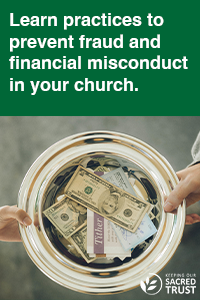“For where your treasure is, there your heart shall be also.” (Matthew 6:21) Jesus talked a great deal about money. And in our monetized society, effective pastoral ministry has a lot to do with how it is acquired, how it is spent, how it is accounted for, and how it can be both a resource and a stumbling block for effective discipleship and mission. As the son of a C.P.A., I thought when I went to seminary I was moving away from my father’s profession. I now realize that pastoral leadership is often about getting treasures and hearts in the same room and the same conversation.
Here’s the good news. We are finding that this is an area where we can see great improvement in a short period of time. And that growth in competency reduces anxiety and leads to a sense of personal liberation and empowerment as leaders.
We experience this in counseling, where money and the unwillingness to talk about it is often at the heart of difficulties in marriage, between parents and their children, between siblings, and between siblings and their aging parents. We experience this when building the annual church budget and, long before that, in building a vision for the church’s ministry.
It has been said that we cannot effectively lead others where we ourselves have not gone first. Our basic responsibility as Christian stewards is to manage our personal financial resources so that we can care for ourselves and our families and marshal the resources needed to respond to God’s call to generous giving. This is especially true for clergy who are expected to teach and model faithful stewardship within our congregations. Mastering personal finances is both a personal and a pastoral responsibility.
Acquiring basic financial literacy skills also lays a foundation for the work of church budgeting and financial management. As one seminary student put it, “If I can keep a budget, then I can instruct the church to keep a budget.” Clergy who have healthy personal finances are better equipped to institute healthy financial practices in the congregations they lead.
Yet many clergy feel awkward in those moments and find it difficult to lead in this realm. Often, it is because we haven’t had these conversations within our own families and have not acquired the skills and habits of sound personal finance. Some of us are burdened by the residual impact of the cost of professional education or other debts. If we do not have basic financial and economic literacy, we aren’t credible when talking about God’s economy. We should feel as sure-footed walking into a member’s business as we do walking into their hospital room. We should have something to offer to the many in our congregations who live in quiet financial desperation. And we should be prepared to talk both about the burdens of poverty and its causes.
Wesley is engaged in a major study of clergy financial sustainability. We are finding that entering seminarians and current clergy have low levels of knowledge and confidence about the management of their own finances. But here’s the good news. We are also finding that this is an area where we can see great improvement in a short period of time. And that growth in competency reduces anxiety and leads to a sense of personal liberation and empowerment as leaders.
In addition to offering a course on clergy personal finances each year, Wesley Seminary is developing a set of free online resources to help clergy master the attitudes and aptitudes essential to sound personal stewardship. This initiative is part of a broader effort to stem the tide of student debt that encumbers the ministry of so many seminary graduates while also enhancing our ongoing efforts to equip seminary students, practicing pastors, and congregational leaders in the basics of personal and congregational stewardship.
While the church faces many critical challenges today, none can be adequately addressed unless we effectively steward the financial resources God has entrusted to us. The credibility of our witness is at stake in how we embody this foundational element of faithful living.
Related Resources:
- A Dialogue About Stewardship and Personal Finances by Robert Moon
- Your Money Autobiography by Ginger Anderson-Larson
- Overcoming the Fear of Talking About Money by Cathy Abbott






